Paying into your retirement pot can feel like a luxury, but it can be the most important financial decision of your life
I often speak to NHS staff who are thinking about opting out of their pension scheme. Some already have. The same is said for my colleagues who deal with teaching staff.
Most of these people are younger or mid-career professionals facing impossible financial pressures. And with living costs rising, bills mounting, and wages stretched, I completely understand the temptation to claw back a few hundred pounds a month in take-home pay.
Recent figures show that a growing number of NHS and public sector workers are doing exactly that. Some 75,421 NHS workers opted out of their pension scheme in the 2023/24, according to a Freedom of Information request obtained by The Times.
Earlier this year, The i Paper reported that teachers are also opting out of saving for their retirement due to financial pressures, after the School Teachers’ Review Body (STRB), which gives recommendations to the Government on teacher pay, said there was evidence of staff “opting out of the existing pension arrangements.“
It’s easy to see why. For someone on a modest salary, the employee contribution to the pension scheme can feel like an unaffordable luxury, especially when it’s competing with rent, childcare, energy bills and weekly shops.
The Teacher’s Pension Scheme (TPS) dictates that employers pay in 28.68 per cent and the employee contributions range from 7.4 to 11.7 per cent.
Meanwhile, the NHS employee contribution rate is between 5.2 and 12.5 per cent, whilst the employer rate is a standard 23.7 per cent.
It’s entirely understandable that NHS workers are calling for fairer pay. If salaries aren’t keeping pace with the cost of living to the point where some feel they can’t afford to stay in the pension scheme, something clearly isn’t right.
No one should have to choose between financial stability now and security in retirement.
While the decision to opt out may ease short-term pressure, it can come at a serious long-term cost. Unfortunately, many people don’t fully realise what they are walking away from.
The NHS pension and the TPS, along with other public sector schemes, are what is described as defined benefit, which means it guarantees you a secure income for life once you retire.
These schemes include extremely valuable benefits such as life cover, spouse and family benefits, and protection if you become too ill to work.
These features are often overlooked, but they can be expensive and difficult to replicate elsewhere, especially if you leave it late in your career to try and make up the difference.
Opting out doesn’t just mean giving up your future retirement income. It also means losing access to these safety nets. And that loss can have real consequences if life takes an unexpected turn.
It’s also important to remember that your pension is part of your overall reward package as an NHS employee.
To provide you with these benefits, your NHS employer pays 23.7 per cent of pensionable pay to the scheme, highlighting just how valuable your NHS pension really is, far beyond what many people realise.
Walking away from it is effectively giving yourself a pay cut and turning down thousands of pounds in future income and benefits each year.
Of course, none of this changes the reality that people are struggling financially. The cost of living crisis has hit public sector workers hard, and the current pressures are not going away anytime soon.
Choosing to opt out of the pension may feel like the only available way to make ends meet. But in my experience, people often make the decision without a clear view of what they are giving up or how difficult it may be to rebuild their retirement plans later on.
There is support available. Speaking to a financial adviser can help you understand your options and plan ahead. Even just running through a few “what if” scenarios can be enough to reframe your decision and give you peace of mind.
The NHS pension and other public sector schemes remain some of the most generous and secure retirement schemes in the country. It may not feel like a priority right now, but sticking with it could be one of the most important financial decisions you make.
For those who are in, staying in is usually the best move. And for those who have opted out, it’s never too late to look again at whether rejoining is possible and right for you.
Graham Crossley is NHS pension specialist at wealth management firm, Quilter
